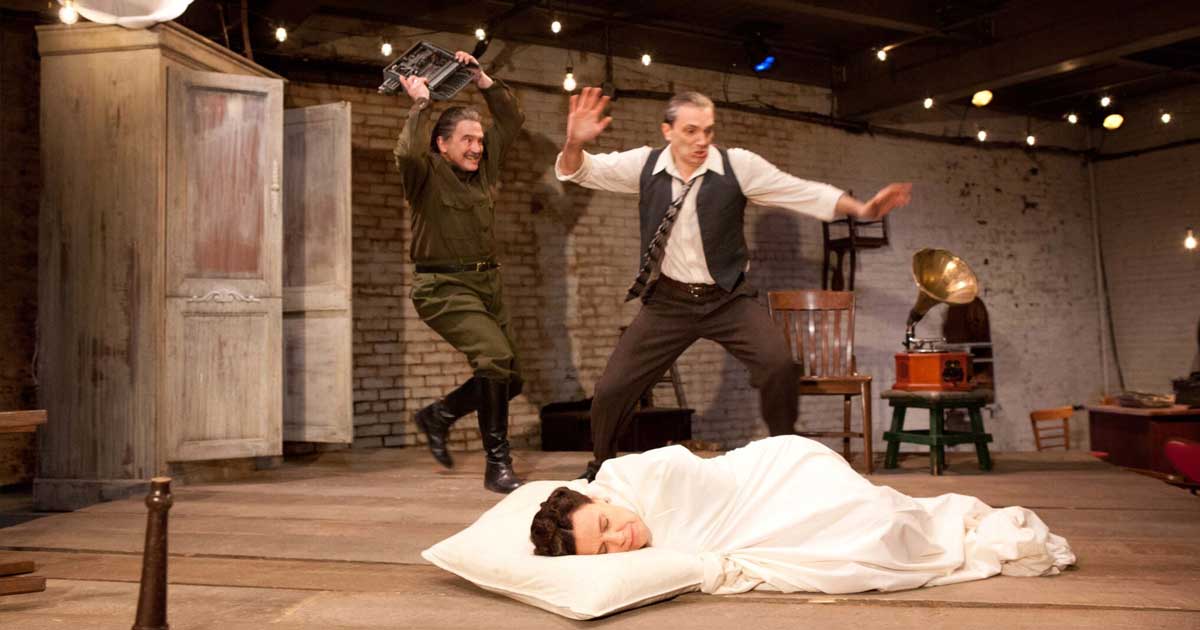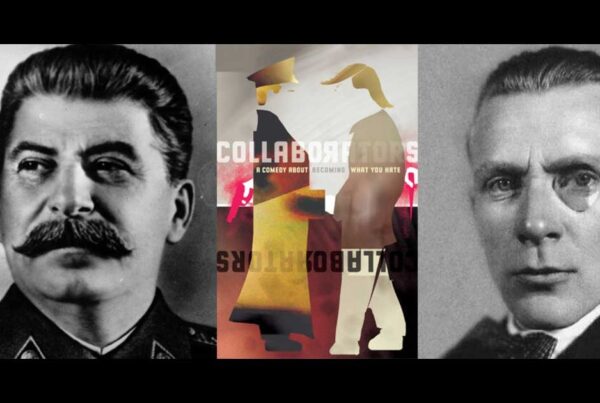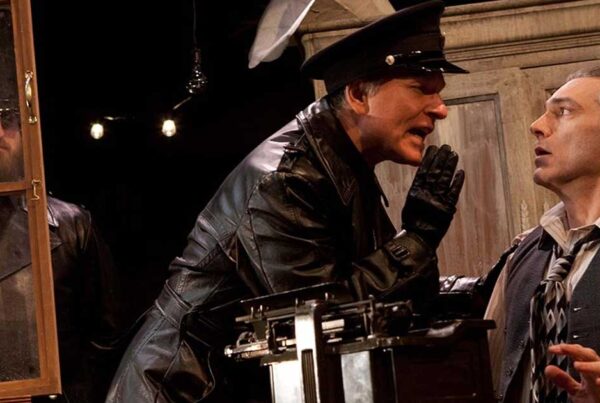
The Pittsburgh Tatler – There’s a diabolically funny moment in the first act of Collaborators: Josef Stalin (played with demonic relish by Martin Giles), having summoned playwright Mikhail Bulgakov (Tony Bingham) to his secret office to work on a play glorifying Stalin’s life, shoos Bulgakov away from the typewriter and starts merrily pounding away at the keys. The moment is funny because we don’t expect a figure like Stalin to find such joy in writing a play; the moment is diabolical because it encourages us to see one of history’s most monstrous autocrats as human, likable, and perhaps even a little bit charming.
That’s a dangerous slippery slope, as the remainder of the play reveals. For Bulgakov, too, is disarmed by the dictator’s enthusiasm for ghostwriting his play, and as his artistic “collaboration” with Stalin develops, he is drawn further and further down that slope into tragic collusion with a political regime he has devoted his entire life and work to resisting.
But first there’s satiric comic hay to be made out of the vicissitudes of working as an artist under the autocratic Soviet regime. It’s 1938, and Bulgakov, a dissident sharing a cramped and cold Moscow apartment with his wife Yelena and three others, has spent a career seeing his work fall in and out of the graces of the Soviet leadership. So large looms Stalin’s power over his psyche that he suffers a recurrent nightmare – staged with glorious Keystone Kops anticness at the start of the show – in which Stalin bursts out of a cupboard, chases him around the stage, and threatens to kill him with his own typewriter. But Stalin doesn’t only wield psychic power over Bulgakov: the secret police also have the authority to shut down his newest play, which they don’t hesitate to use as leverage to coerce Bulgakov into doing their bidding.
That may not sound like a comic premise, but playwright John Hodge offers plenty of laughs through his sharp, ironic dialogue and darkly wry situations. Hodge, a British writer who is best known for writing the screenplay for Trainspotting, seems to have a Russian sense of humor, one that dredges the comical out of the depths of despair, and director Jed Harris stages that comedy with a deft touch, masterfully managing a tonal shift over the course of the play from nimble satire to a laughter that sticks in your throat in the end. The play’s sound design (Joe Pino) and costumes (Susan Tsu) aid in establishing a world that is simultaneously a bit topsy-turvy and high-stakes serious; Narelle Sissons’s set, in which nearly all of the cupboards are bare, provides the versatile space for Harris’s animated staging.
Harris has assembled a top-notch group of actors to flesh out this comedy, including John Shepard, priceless as a lascivious doctor; Jonathan Visser, dolorous as Grigory, a writer whose work has been banned; and Dana Hardy, who centers the play’s emotional heart as Yelena. Martin Giles plays Stalin with a comic abandon that slides eerily into menace at the end of the play, and Ken Bolden’s Vladimir, of the secret police, caroms schizophrenically between merciless intimidator and enthusiastic aesthete. But the center of the play is Bulgakov, and Tony Bingham is brilliant in the role. He manages the tricky feat of making his Bulgakov seem like a real person and yet still rendering him big and broad enough to inhabit the expansive comedy of the play. His sympathetic and subtle portrayal of the character helps us to see how readily anyone – even one of us – could be manipulated into becoming what we hate: his Bulgakov is like the frog in slowly boiling water that doesn’t feel how hot it’s getting until it’s too late.
There’s a warning in Bulgakov’s fate for all of us, especially in light of the creeping, inexorable normalization of not only extreme alt-right ideologies, but also the dismantling of democratic norms, hidden behind a smokescreen of fake news and twittered distractions. Collaborators opened the day after missile strikes against a Syrian airbase magically made the current occupant of the White House – a person who has boasted of sexually abusing women and who misrepresents the truth in seven out of ten statements – appear decisive and “presidential.” The water keeps getting hotter, and it may soon be too late to hop out. That may not be very funny, but, by its end – and in the best of ways – neither is Collaborators…




